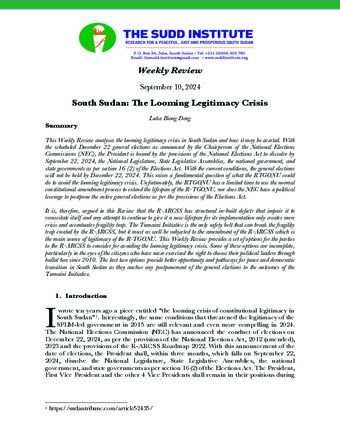South Sudan: The Looming Legitimacy Crisis
Publication Summary
This Weekly Review analyses the looming legitimacy crisis in South Sudan and how it may be averted. With the scheduled December 22 general elections as announced by the Chairperson of the National Elections Commissions (NEC), the President is bound by the provisions of the National Elections Act to dissolve by September 22, 2024, the National Legislature, State Legislative Assemblies, the national government, and state governments as per section 16 (2) of the Elections Act. With the current conditions, the general elections will not be held by December 22, 2024. This raises a fundamental question of what the RTGONU could do to avoid the looming legitimacy crisis. Unfortunately, the RTGONU has a limited time to use the normal constitutional amendment process to extend the lifespan of the R-TGONU, nor does the NEC have a political leverage to postpone the entire general elections as per the provisions of the Elections Act.
It is, therefore, argued in this Review that the R-ARCSS has structural in-built defects that impair it to resuscitate itself and any attempt to continue to give it a new lifespan for its implementation only creates more crisis and accentuates fragility trap. The Tumaini Initiative is the only safety belt that can break the fragility trap created by the R-ARCSS, but it must as well be subjected to the amendment of the R-ARCSS which is the main source of legitimacy of the R-TGONU. This Weekly Review provides a set of options for the parties to the R-ARCSS to consider for avoiding the looming legitimacy crisis. Some of these options are incomplete, particularly in the eyes of the citizens who have never exercised the right to choose their political leaders through ballot box since 2010. The last two options provide better opportunity and pathways for peace and democratic transition in South Sudan as they anchor any postponement of the general elections to the outcomes of the Tumaini Initiative.
Luka Biong Deng Kuol's Biography
Luka Biong Deng is a Senior Research Fellow and Consultant at the Sudd Institute, an Adjunct Professor of Peace, Development, and Security Studies at the University of Juba, and an Adjunct Distinguished Professor of African Security Studies at the Africa Center for Strategic Studies (ACSS), National Defense University, USA. He served in various capacities in the governments of Sudan and South Sudan, with think-tanks around the world and a member of various global expert groups including Integrated Food Security Phase Classification (IPC) Famine Review Committee and the Overseas Development Institute (ODI) Global Advisory Panel on the Future of Human Action. Dr. Deng holds a Ph.D. in Development Studies Policy from the Institute of Development Studies (IDS), University of Sussex, UK.

